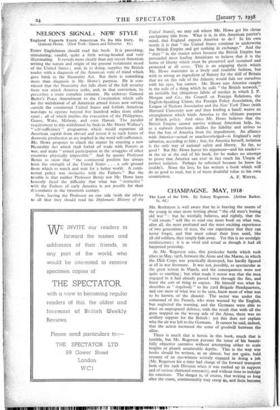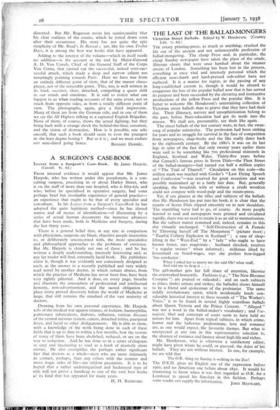CHAMPAGNE. MAY, 1918 Ma. ROGERSON is well aware that he
is braving the taunts of the young in once more writing about " the old men's boring old war " : but he wistfully believes, and rightly, that the " old sweats " will like to read one more book on what was, after all, the most profound and the most exciting experience of two generations of men, the one experience that they can never forget, and that must colour their lives until, like all old soldiers, they simply fade away. Yet this is no nostalgic reminiscence ; it is as vivid and actual as though it had all happened yesterday.
As Mr. Rogerson says, this particular battle which took place in May, 1918, between the Aisne and the Marne, in which the IXth Corps was practically destroyed, has hardly figured at all in war literature. It was not, possibly, so spectacular as the great retreat in March, and the consequences were not quite so startling ; but what made it worse was that the men engaged in it had already passed twice through the fire, and knew the sort of thing to expect. He himself was what he describes as " dogsbody " to the 23rd Brigade Headquarters, and saw most of what was to be seen, knew most of what was to be known, of the disaster. The sector was under the command of the French, who were warned by the English, but neglected the warning, and the Germans were able to blast an unprepared defence, with the result that with all the guns trapped on the wrong side of the Aisne, there was no artillery support for the British : yet this does not explain why the air was left to the Germans. It cannot be said, indeed, that the action increased the sense of goodwill between the allies.
There is much that is heroic in this book, much that is terrible, but Mr. Rogerson pursues the tenor of his beauti- fully objective narrative without attempting either to scale heights or plumb unutterable depths. This is the way war books should be written, as an almost, but not quite, bald account of an eye-witness actively engaged in doing a job (Mr. Rogerson for a time had charge of the forward transport both of the 19th Division when it was rushed up in support and of various shattered remnants), and without time to indulge his emotions. The danger is, of course, that writing so long after the -eyent, sentimentality may creep ip..,..anel.faotsbecontq
distorted. But Mr. Rogerson never lets sentimentality blur his clear outlines of the events, which he jotted down soon after their occurrence. His story has not quite the epic simplicity of Mr. Read's In Retreat ; yet, like his own Twelve Days, it is among the best war books that have appeared.
Adding to the interest of the volume—which in itself needs no addition—is the account at the end by Major-General A. D. Von Unruh, Chief of the General Staff of the Corps Von Conta, that carried out the successful, indeed over-suc- cessful attack, which made a deep and narrow salient too temptingly pointing towards Paris. Here we have war from an entirely different point of view, that of the master chess- player, not of the miserable pawn. This, too, is well written in its kind, succinct, clear, detached, compelling a queer shift in our minds and emotions. It is odd to notice what can happen to us when reading accounts of the same event, not so much from opposite sides, as from a totally different point of view. The photographs, again, give a third impression. Many of them are from the German side, and in one of them we see the All Highest talking to a captured English Brigadier. None of them, of course, shows the actual fighting, but they bring back with a strange shock the behind-the-lines sensation, and the vision of destruction. How is it possible, one asks oneself, that such a book should seem to even the youngest in the least degree boring ? But so it is ; and we must endure










































 Previous page
Previous page